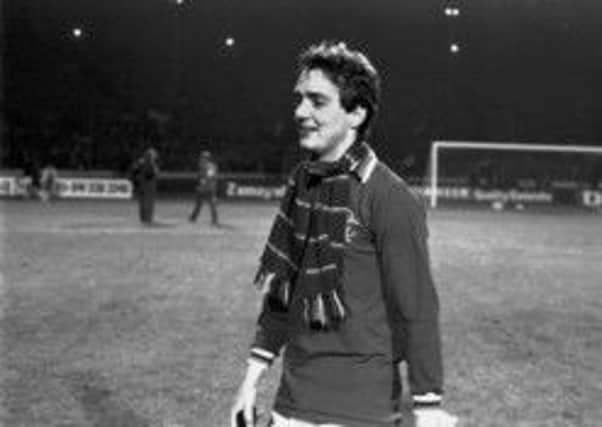Ian Redford, Dundee and Rangers star, dies aged 53


The untimely and mind-numbing passing of Redford at the age of 53, whose body was discovered in woodland near his Ayrshire home yesterday, is a desperately sad end to the life of a man who in a playing career spanning almost 20 years was one of the most eye-pleasing midfielders in the game.
Despite being Scotland’s most expensive player when he joined Rangers from Dundee for £210,000 in 1980, then later illuminating the European stage with some quite exceptional performances for Dundee United, Redford never played senior international football.
Advertisement
Hide AdAdvertisement
Hide AdHe was unfortunate enough to ply his trade at a time when Scotland could count on a steady production line of top-class performers in the central area of the pitch, the likes of Graeme Souness, Paul McStay, John Wark, Jim Bett and Gordon Strachan ahead of him in the queue.
Nonetheless, Redford was a fine exponent of the midfield art, combining a dynamic workrate with positional awareness and passing ability which made him highly valued by the managers who placed their faith in him.
The son of a Perthshire farmer, Redford began his senior career with Dundee where he made his first team breakthrough in his early teens. In 1978, he scored all four goals in a 4-1 win against St Mirren, a feat no player for the Dens Park club has ever matched since.
Although he started out as a striker, and always retained an eye for goal, Redford’s talents gradually became better utilised as a forward-thinking midfield player. He was still two months short of his 20th birthday when Rangers manager John Greig sanctioned that record fee to take him to Ibrox.
Redford joined a team struggling to maintain their sense of pre-eminence in the Scottish game, challenged not just by traditional rivals Celtic but also by the emerging forces of Aberdeen and Dundee United under the respective guidance of Alex Ferguson and Jim McLean. He would later admit that he found his time with Rangers something of an overpowering experience, one he struggled to cope with, but Redford could actually reflect with pride on his contribution over five years at Ibrox. He scored 42 goals in 247 games for Rangers, a more than respectable return, with the highlight his stunning late winner in the 1981-82 League Cup Final against Dundee United at Hampden.
It was one of two League Cup winners’ medals he won as a Rangers player, along with a 1981 Scottish Cup triumph, but he suffered along with the rest of the squad during a period of general under-achievement which saw the demise of both Greig and then the returning Jock Wallace as managers.
In August 1985, the start of Wallace’s final season in charge before Graeme Souness arrived to begin the seismic revolution at Rangers, Redford was sold to Dundee United. It would prove anything but a backward step in his career.
Redford flourished under Jim McLean who utilised his abilities to their greatest effect. Although he did not collect any winners’ medals during his time at Tannadice, he was a key performer in one of the most attractive teams Scottish football has produced in the modern era.
Advertisement
Hide AdAdvertisement
Hide AdThe European stage seemed to especially suit Redford’s cultured and often intuitive skills. At the Nou Camp on 18 March 1987, it was his perfectly weighted cross which John Clark met to power home the goal which set United on their way to a stunning Uefa Cup quarter-final victory over Barcelona. In the semi-final, Redford was the stand-out performer in the second leg against Borussia Moenchengladbach in Germany.
After a 0-0 draw at Tannadice, McLean’s men were barely fancied to progress but they out-played and out-thought the Bundesliga side in the return. After Iain Ferguson put them ahead, Redford capped a hugely influential contribution by netting their second goal in a 2-0 win in the closing moments.
The two-legged Uefa Cup final brought disappointment, a leg-weary United side losing to IFK Gothenburg in a season which also saw them runners-up to St Mirren in the Scottish Cup Final. Redford scored 32 goals in 155 appearances in just over three years with United before moving to Ipswich Town for £200,000 in November 1988.
His time with the Suffolk club proved largely unfulfilling and he returned to Scotland to join St Johnstone, the club he supported as a boy in Errol. In 1993, he became player-manager at Brechin City, replacing John Ritchie who had left to join the coaching staff at Hibs.
The Glebe Park club had just been promoted to the First Division but the onset of league reconstruction meant they had to finish no lower than seventh in the table to retain their status. With a part-time squad, it proved an impossible task for Redford who was dismissed at the start of the following season. He continued his playing career at Raith Rovers, relishing the call he got from his former Rangers team-mate Jimmy Nicholl, and was amply rewarded when he made a substitute appearance in the Kirkcaldy club’s stunning 1994-95 League Cup Final win against Celtic at Ibrox.
Redford had a variety of business interests after his playing career finished, including time as a players’ agent. He flirted with a career in golf, where his son Ian junior is a promising talent, and just last year self-penned his autobiography ‘Raindrops Keep Falling On My Head’ in which he related his lifelong struggle with deafness in one ear.
His sudden passing leaves family, friends and former team-mates to mourn the loss of a fine and perhaps often undervalued talent.